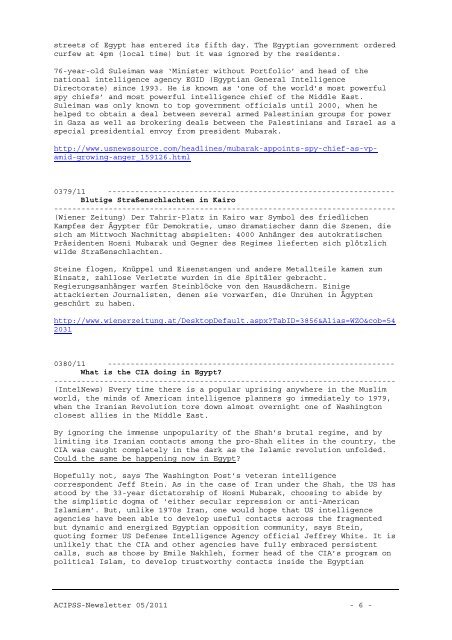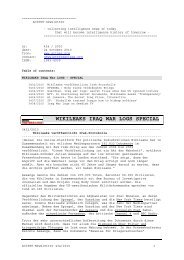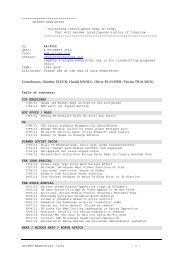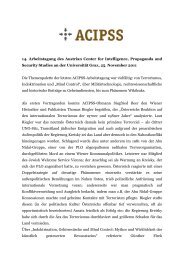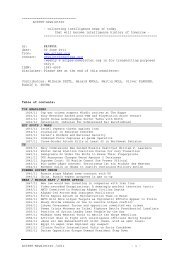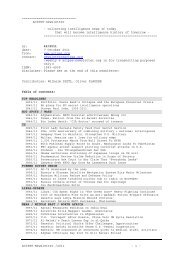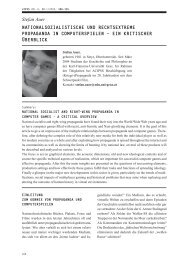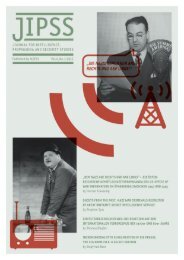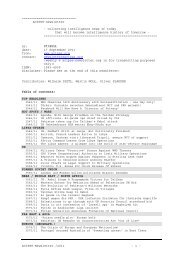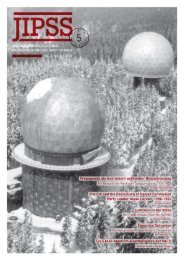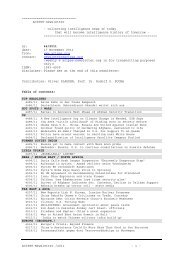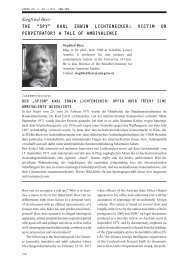Create successful ePaper yourself
Turn your PDF publications into a flip-book with our unique Google optimized e-Paper software.
streets of Egypt has entered its fifth day. The Egyptian government ordered<br />
curfew at 4pm (local time) but it was ignored by the residents.<br />
76-year-old Suleiman was ‘Minister without Portfolio’ and head of the<br />
national intelligence agency EGID (Egyptian General Intelligence<br />
Directorate) since 1993. He is known as ‘one of the world’s most powerful<br />
spy chiefs’ and most powerful intelligence chief of the Middle East.<br />
Suleiman was o<strong>nl</strong>y known to top government officials until 2000, when he<br />
helped to obtain a deal between several armed Palestinian groups for power<br />
in Gaza as well as brokering deals between the Palestinians and Israel as a<br />
special presidential envoy from president Mubarak.<br />
http://www.usnewssource.com/headlines/mubarak-appoints-spy-chief-as-vpamid-growing-anger_159126.html<br />
0379/11 ---------------------------------------------------------------<br />
Blutige Straßenschlachten in Kairo<br />
---------------------------------------------------------------------------<br />
(Wiener Zeitung) Der Tahrir-Platz in Kairo war Symbol des friedlichen<br />
Kampfes der Ägypter für Demokratie, umso dramatischer dann die Szenen, die<br />
sich am Mittwoch Nachmittag abspielten: 4000 Anhänger des autokratischen<br />
Präsidenten Hosni Mubarak und Gegner des Regimes lieferten sich plötzlich<br />
wilde Straßenschlachten.<br />
Steine flogen, Knüppel und Eisenstangen und andere Metallteile kamen zum<br />
Einsatz, zahllose Verletzte wurden in die Spitäler gebracht.<br />
Regierungsanhänger warfen Steinblöcke von den Hausdächern. Einige<br />
attackierten Journalisten, denen sie vorwarfen, die Unruhen in Ägypten<br />
geschürt zu haben.<br />
http://www.wienerzeitung.at/DesktopDefault.aspx?TabID=3856&Alias=WZO&cob=54<br />
2031<br />
0380/11 ---------------------------------------------------------------<br />
What is the CIA doing in Egypt?<br />
---------------------------------------------------------------------------<br />
(IntelNews) Every time there is a popular uprising anywhere in the Muslim<br />
world, the minds of American intelligence planners go immediately to 1979,<br />
when the Iranian Revolution tore down almost overnight one of Washington<br />
closest allies in the Middle East.<br />
By ignoring the immense unpopularity of the Shah’s brutal regime, and by<br />
limiting its Iranian contacts among the pro-Shah elites in the country, the<br />
CIA was caught completely in the dark as the Islamic revolution unfolded.<br />
Could the same be happening now in Egypt?<br />
Hopefully not, says The Washington Post’s veteran intelligence<br />
correspondent Jeff Stein. As in the case of Iran under the Shah, the US has<br />
stood by the 33-year dictatorship of Hosni Mubarak, choosing to abide by<br />
the simplistic dogma of ‘either secular repression or anti-American<br />
Islamism’. But, u<strong>nl</strong>ike 1970s Iran, one would hope that US intelligence<br />
agencies have been able to develop useful contacts across the fragmented<br />
but dynamic and energized Egyptian opposition community, says Stein,<br />
quoting former US Defense Intelligence Agency official Jeffrey White. It is<br />
u<strong>nl</strong>ikely that the CIA and other agencies have fully embraced persistent<br />
calls, such as those by Emile Nakhleh, former head of the CIA’s program on<br />
political Islam, to develop trustworthy contacts inside the Egyptian<br />
<strong>ACIPSS</strong>-Newsletter <strong>05</strong>/<strong>2011</strong> - 6 -


